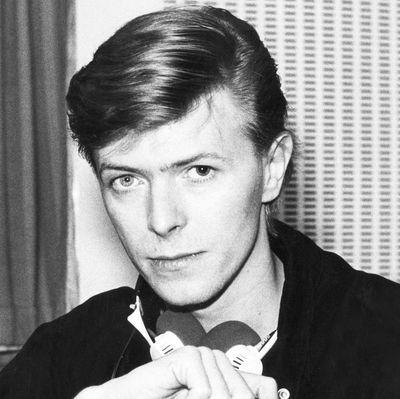
ItÔÇÖs been two years since David Bowie died and itÔÇÖs still hard to believe heÔÇÖs no longer here. The 90-minute British documentary David Bowie: The Last Five Years, which airs tonight on HBO on what would have been BowieÔÇÖs 71st birthday, doesnÔÇÖt necessarily make sense of his absence from this Earth, but it does uncover the connections between the work in the final chapters of his life and the passions that helped cement his place as an experimental pop music icon.
Directed by Francis Whately and previously broadcast on British television, The Last Five Years features never-before-seen footage of Bowie as well as conversations with the musicians, producers, and music video directors who worked with him on his final tour back in the early 2000s (when he had a heart attack that compelled him to turn away from live performances); the Man Who Fell to EarthÔÇôinspired musical Lazarus; and his final two albums, 2013ÔÇÖs The Next Day and Blackstar, which was released two years ago today, two days before Bowie died of cancer.
Bowie became famously private in his later years, which forced Whately and his team to document his creative output with very little in the way of recent on-camera interviews with the man himself. They more than rise to the challenge, stitching together BowieÔÇÖs words via voice-over with the recollections of his colleagues and visual material from the vast expanse of his career. The result is a portrait that is personal without delving into BowieÔÇÖs personal life ÔÇö we donÔÇÖt hear from his wife, Iman, or either of his children ÔÇö and one that exhibits deep reverence for his music without going so far as to deify the artist.
Fans of BowieÔÇÖs work are already aware of the ways in which his later output links back to his earlier work, but itÔÇÖs still moving to see that point made here. After discussing how BowieÔÇÖs feelings about gun violence influenced The Next DayÔÇÖs┬áÔÇ£ValentineÔÇÖs Day,ÔÇØ for example, the film eases back in time to a Bowie appearance on The Dinah Shore Show in 1976 where he performed ÔÇ£Five Years,ÔÇØ a song about people wrestling with the knowledge that the Earth only has half a decade left in it.
ÔÇ£IÔÇÖm not a Dylan,ÔÇØ we hear Bowie explain, ÔÇ£and IÔÇÖm not somebody who can sit down and stoically write a clear picture of whatÔÇÖs happening. But I can leave a very strong impression of how I feel about it.ÔÇØ As the film tells us, in the ÔÇÖ70s and right up until Bowie took his last breaths, he was an astute observer of the world, so much so that he was able to synthesize those observations into music that often felt so intimate, it was easy to overlook its social or political content.
WhatÔÇÖs most gratifying about watching David Bowie: The Last Five Years, though, is that, like so many documentaries about artists who have left us, it resurrects its subject for a little while. Although this is a serious and inevitably sad film, there is also great joy in it, in the performances from BowieÔÇÖs A Reality Tour in 2003 and 2004, when he looks as vibrant and energized as ever in his mid-50s, both onstage and while clowning around off of it. (His fellow musicians note that he was funnier than he got credit for. Oh, and he also sometimes liked to kick back and play with a claw machine.)
ThereÔÇÖs even joy embedded in BowieÔÇÖs desire to continue creating while confronting his illness, an impulse that his collaborators say never left him. Toward the end of The Last Five Years, BowieÔÇÖs longtime producer Tony Visconti plays a stripped-down version of the song ÔÇ£LazarusÔÇØ that consists of nothing but BowieÔÇÖs vocal ÔÇö ÔÇ£AinÔÇÖt that just like meÔÇØ ÔÇö sounding as powerful and emotionally naked as anything he ever recorded.
ÔÇ£A man at the top of his game,ÔÇØ Visconti says, still in awe of his talent and, seemingly, still stunned that heÔÇÖs gone. Which is exactly how so many people also feel on the anniversary of his death.


